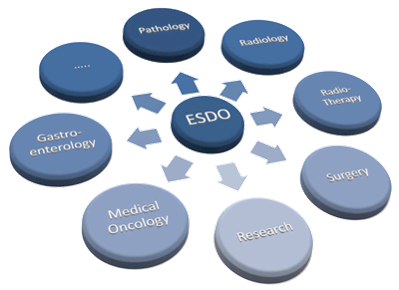
Dealing with digestive cancer as a multidisciplinary disease, the European Society of Digestive Oncology addresses a broad panel of different subspecialities and experts for the purpose of a real interdisciplinary discussion.
Dear Colleagues
Dear Friends
The European Society of Digestive Oncology (ESDO) addresses its special thanks to all individual supporters, to United European Gastroenterology (UEG) as well as to all friends from the International Digestive Cancer Alliance (IDCA) for supporting the establishment of this association in 2008.
ESDO is a non-profit scientific and educational association that extends its activities throughout Europe, comprising individual members, national societies and study groups of digestive oncology.
Our Society sees its purpose in improving and propagating medical treatment of GI-tract tumours, particularly in a multidisciplinary evidence-based approach. ESDO is to set important milestones in the enhancement and promotion of screening, early detection, primary prevention and management of pre-malignant or/and malignant diseases of the GI-tract. Our Society organizes education and academic exchange in the field of digestive oncology and develops guidelines and recommendations for all aspects of digestive oncology for the benefit of patients.
The ESDO Governing Board invites all interested colleagues, national societies and groups dealing with digestive cancer to regularly visit the ESDO website and to apply for ESDO membership. Join our venture, as we are developing the leading European platform in the field of digestive oncology!
Yours sincerely
Eric Van Cutsem, ESDO President
Thomas Seufferlein, ESDO Secretary General
Our mission is
Download the Statutes of the European Society of Digestive Oncology.
ESDO DIVERSITY POLICY
VISION
Creation of a diverse and equal community that contributes to the aims of ESDO, the European Society of Digestive Oncology, and a reversal of disparity that is harmful to professionals, patients and society
AIMS AND OBJECTIVES
1. Drive a sustainable diversity strategy that can be applied across the GI oncology workforce
• Increase awareness of diversity issues for professionals at all levels, across academic organisations and for patient and carer groups
• Link diversity promotion across professional groups in GI oncology
• Enhance relationships between likeminded GI oncology organisations to share best practice
2. Increase diversity in leadership in GI oncology, reverse the demographic mismatch between leaders and workforce by pro-actively tackling under-representation and maintain a balanced leadership
• Promote leadership opportunities across the whole community and prevent biased gatekeeping [barriers that disproportionately disadvantage women and under-represented minorities]
• Identify support, training and mentoring resources for under-represented groups
• Recognise and award diversity champions and successful initiatives
3. Use our influence to promote equality and inclusion, highlight and support diversity in academic and educational initiatives in GI oncology
• Promote diverse and representative conference programmes
• Promote diversity in educational delivery and content
• Monitor and report diversity data to the academic community
4. Work with patient and stakeholder groups to promote equality in access to treatment and research
• Engage with research that addresses health inequalities in under-represented minorities
• Provide advocacy for initiatives to reduce disparity in health care
• Communicate relevant data to the GI oncology community
Download the Diversity Policy of the European Society of Digestive Oncology
Use of this website constitutes acceptance of the User Agreement, the General Terms and Conditions and the Data Protection Statement.